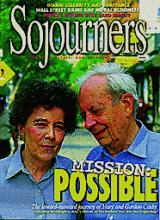Mary Cosby tells the story of writing in her journal that Gordon "sauntered into his 80th year with a new call." One might think that at 80 you would spend your time tying up loose ends, bowing out gracefully, keeping things on an even keel. But maintaining the status quo has never marked Gordon or Mary's life, and it obviously won't begin to now.
Gordon has said many times during this "jubilee" year of Church of the Saviour's history that the world, the city of Washington, D.C., even the neighborhoods where so much of their ministry is centered are no better off now than when they started. Honestly, Gordon insists, the situations are largely worse. The gospel must be lived into and expressed in new, effective, life-giving ways, now more than ever.
The "new call" Mary refers to has been labeled Zacchaen Economics. Jesus' lunch with Zacchaeus in Luke 19 birthed a whole new economic formula into which Gordon is tapping. For many years, Gordon has carried the burden of an increasing awareness that much of the source of poverty in our nation is the result of an economic formula that requires a "haves and haves not" outcome. While the suffering of poverty must be dealt with on an individual basis, ultimate change will never come until the economic system changes.
Who has the answers? Who should be the catalyst and architect to issue a challenge to these structures? The answer for Gordon is that the church must be the voice of this vision--new forms and new structures birthing economic equality. The answers to economic justice would not come from a political or corporate ethos, but rather from the biblical models that are the heritage of the body of Christ.
Read the Full Article

